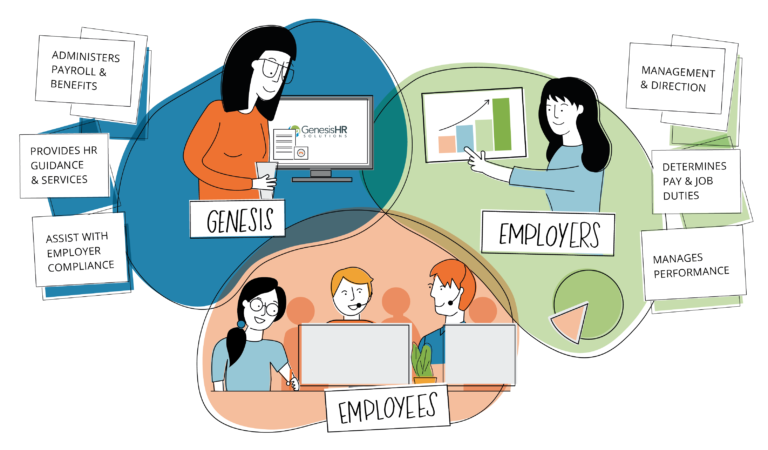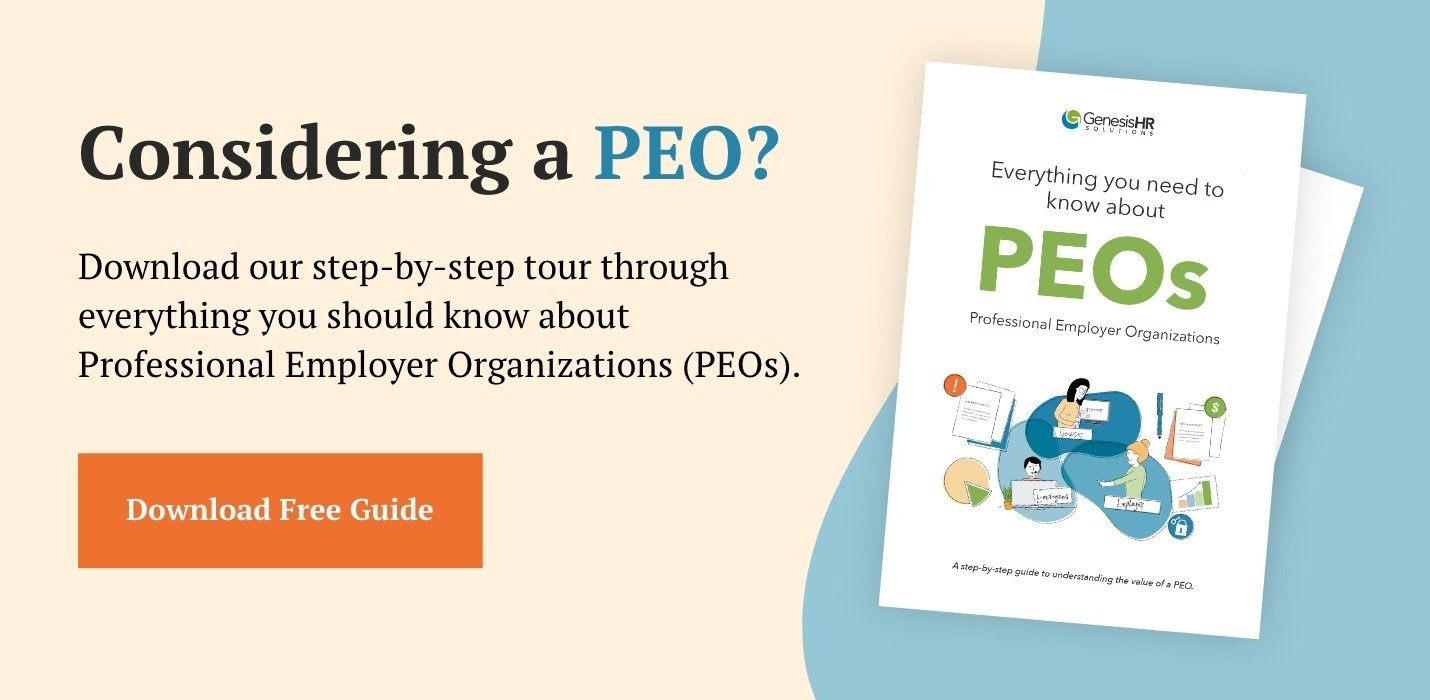Struggling to understand the benefits of hiring a PEO vs. HRO for your company’s HR needs? Deciding between the two can be confusing if you don’t know what the acronyms mean. Because the decision you make will change—perhaps significantly—how your HR functions operate, you need to make sure you understand how both types of HR outsourcing options provide value to your company. Below, we explain a PEO and HRO in detail and compare the two; we also offer some advice on how to select the option that’s best for your business needs.
What is a Professional Employer Organization (PEO)?

According to the National Association of Professional Employer Organizations (NAPEO),
“A professional employer organization (PEO) provides comprehensive HR solutions for small and mid-size businesses. Payroll, benefits, HR, tax administration, and regulatory compliance assistance are some of the many services PEO companies provide to growing businesses across the country.”
Partnering with PEO companies allows businesses of all sizes to outsource almost all of their human resource functions, share employment liability, and, oftentimes, gain economies of scale to bring an improved benefits package to employees. A PEO is an extension of your business and engages with your management team to address complex employee-related matters.
GenesisHR is a PEO. We’ve been a PEO since 1991, and an IRS Certified PEO since 2017. (We were proud to be one of the first wave of approvals for Certified PEOs!)
When you choose to work with a PEO, you are entering a partnership in every sense of the word. Not only do you have the support of the PEO, but you are legally entering a co-employment relationship, which means you are both liable for the employment decisions and actions of the company. For GenesisHR, that means we have “skin in the game”—we are in business with you, and your success in all areas of the HR world is also our success (and responsibility). You can learn more about what it means to work with a PEO in this article.
Your company needs a PEO. Here’s why. Download Everything You Need To Know About PEOs!
What is an HRO?
Human Resources Outsourcing (HRO) is a contractual agreement between an employer and a third-party provider whereby the employer transfers the management of, and responsibility for, certain HR functions to the external provider. Many types of HR outsourcing options are available to employers. (SHRM)
HRO may also be referred to as BPO, or Business Process Outsourcing. According to Centripetal Consulting, it has “traditionally only been available to larger organizations; however, many outsourcers are bringing this model to the mid-market. With an HRO, an employer remains the ‘employer of record’ in this type of arrangement.” You can learn more about the differences in PEOs and other options (like HROs and ASOs) in our article, PEO companies vs. 4 alternatives.
PEO vs. HRO: A Head-to-head Comparison
|
PEO vs. HRO |
|
| PEOs select and manage the third-party partners that best fit the collective group of clients served (insurance carriers, for example). | HROs only manage the third-party partners you choose. |
| PEOs get volume pricing for benefits. | HROs are not involved in choosing benefits packages, so no volume discounts are available. |
| PEO partnerships provide a holistic approach to HR wherein they offer expertise and guidance in all areas of HR, including payroll, compliance, benefits, and more. | HROs typically have a specialty or single area of HR expertise. |
| PEOs that are certified by the IRS and accredited by ESAC are held to the highest standards of service. | HROs have no similar types of distinguishing certification. |
| PEOs cost more due to the higher value and benefits they provide. | HROs cost less than a PEO because their services are limited. |
| A PEO is considered a co-employer. | An HRO is not a co-employer. |
| PEOs assume some risk and liability with regard to the operation of your business. | HROs do not assume any risk or liability for your business. |
PEO vs. HRO: How To Make The Choice
When you’re deciding how to outsource your HR administration, be sure to take into consideration each of these questions:
1. What are you struggling with that you would like to offload to a partner?
First, identify and list the activities you would like to offload. Use that list to see how the solutions you’re considering line up with your needs. For example, if you just need someone to handle one aspect of HR because you already have a dedicated team taking care of other areas, you might prefer to have an HRO. However, if you don’t have a dedicated HR team and you want help with the burdens of HR management, payroll, compliance, and benefits, a PEO like GenesisHR would be your best bet.
2. What are the credentials of the PEO or HRO you’re interested in?
Look at the credentials of the partner you’re considering. If it is a PEO, is it certified by a third party, like the IRS or ESAC? (At GenesisHR, we are proud to be both a Certified PEO and accredited by ESAC.) If it is an HRO, check to see if they are part of the HRO Today Provider Certification Program. Whether you choose an HRO or a PEO, you’re paying to have a partner, so find out how qualified they are before you make an investment.
3. How experienced is the team who will handle your account?
Experience is crucial. Look at the team’s turnover rates, whether they’re a relationship-focused company, and how many years of experience they have in dealing with your areas of need. How do clients like to work with your team? At GenesisHR, our renewal rates are above 97 percent per year—our customer retention rate is a testament to our stellar service and support.
4. How do they select and manage insurance vendors?
Understand how your potential PEO partner selects and manages their insurance vendors. For example, at GenesisHR, we’ve worked with our benefit partners for nearly a decade—these consistent relationships lend stability to you and your employees. Also, you need to make sure you have a clear understanding of the division of responsibilities between you and your PEO or HRO with regard to the insurance/benefits partnership.
5. Do you have the time and resources to handle the HR work yourself?
If you are taking time away from your core business competencies to deal with HR, payroll, benefits selection and administration, regulation and compliance issues, onboarding, and training, a PEO is the best choice for you. They’ll handle all these tasks on your behalf so you can get back to running your business. If the answer is “yes,” than maybe an HRO is a good choice for your company.
6. Do you feel confident handling compliance-related issues?
If the answer is yes, you might be in the market for an HRO. With an HRO, compliance is up to you.
If the answer is no, a PEO is a better bet. In a coemployment situation, risk is shared between the PEO and your company. Similarly, a PEO and the client share certain responsibilities, especially around employer compliance.
As a co-employer, the PEO provides information around state and federal compliance issues that impact you and your business. Your PEO representative will communicate the requirements and in many cases provide guidance on how to meet those requirements. In some cases, it is up to you, the employer, to take the action required. (For example, the PEO will likely provide the required state and federal labor law poster for display, but you need to post it in your worksite in an area visible to all employees.) WIth an HRO, this is simply not the case: Your compliance is up to you, and you alone.
We want to be your PEO.
Have you decided you’re interested in working with a PEO? If so, great! Above we mentioned a few things you should look for in a PEO partner, but take a look at this more comprehensive list of questions. Then, we hope you’ll schedule a call with us.
As one of the first certified PEOs in the nation, GenesisHR meets the “gold standard” of service and will be an invaluable asset to your business. We specialize in partnering with small to midsize businesses across the country, and we’re proud of the relationships we build with each and every one of our clients—you’re never just a number to us!
Let’s schedule a free discovery call now to talk about how GenesisHR can help relieve your organization of the burden of HR, payroll, benefits administration, and more, so you can focus on what you do best—grow your bottom line.




